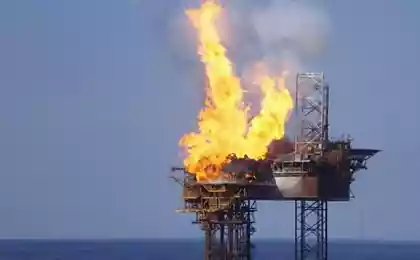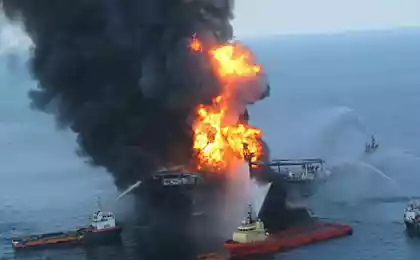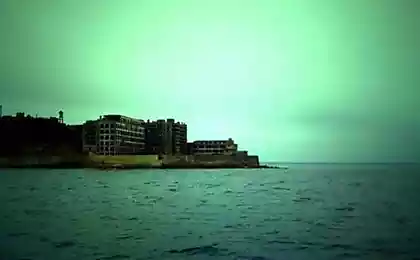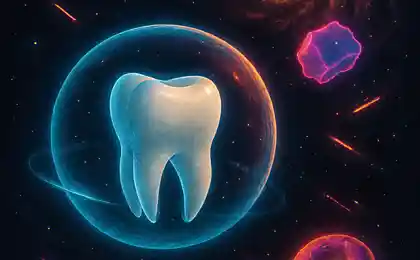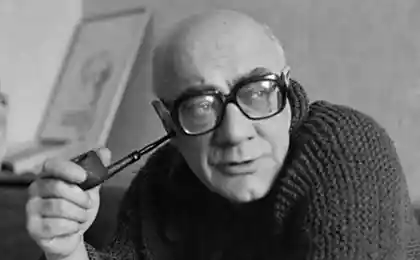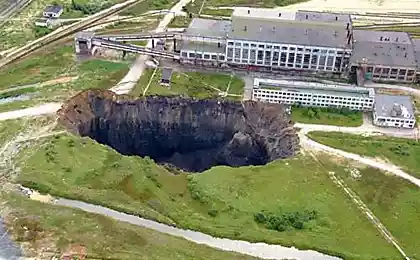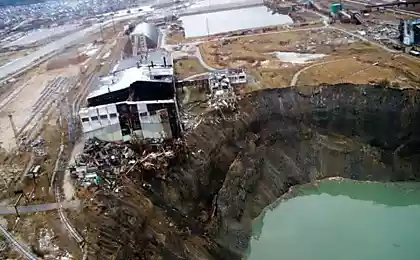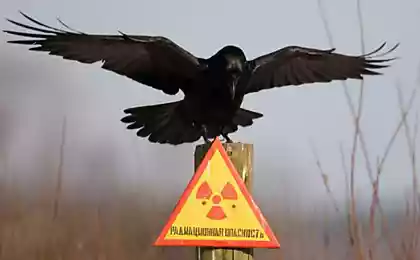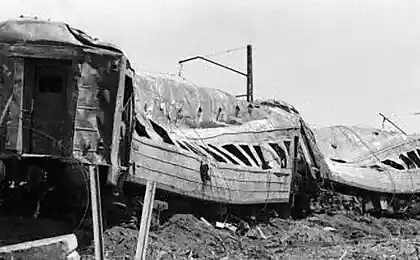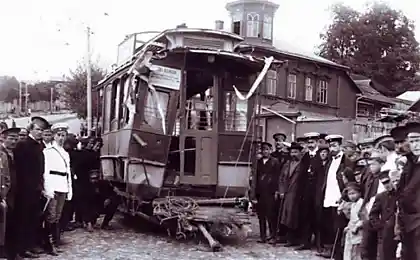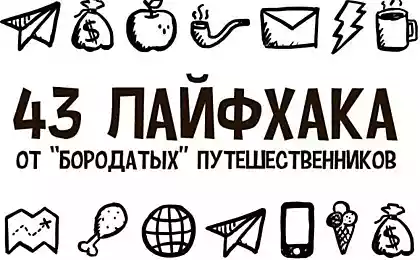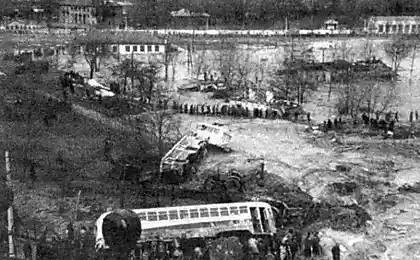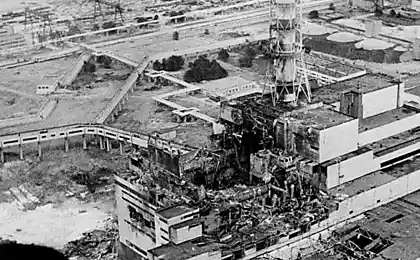429
What Not to Do in Technological Disasters

Photo: ecocatlady.blogspot.com
Let’s say that one evening you went to the window to admire the sunset and saw the sunset. My God! We saw a glow over a nearby company. Fire, smoke, ash rising to the sky, bloody glows on the clouds. Heard dozens of fire sirens howling. Fire! And a fire of catastrophic proportions! What to do and what not to do in this situation?
What exactly not to do is to call all relatives to admire the unusual, which happens, perhaps, once in a hundred years, spectacle. Unfortunately, most often, this is what the residents who are longing for acute sensations do.
They gather, line up in several rows around the perimeter of the fire, like fans in the football arena, and stare at a possibly deadly accident for them. They look into the eyes of their own death and talk about tomorrow, which, perhaps, they will not have.
So it was in Chernobyl, where the families of the workers of the nuclear power plant and the workers of the nuclear power plant (!) all evening and midnight watched the fire at the power unit, not for a moment thinking about the consequences that it can have! This has been the case in many other, less known, emergencies.
In conditions of man-made accidents, any idle curiosity is punishable! Accidents are not a circus or a sporting event, and it is dangerous to approach them aesthetically. Sometimes it's deadly. Here, in contrast to spectacular events, the opposite is true – the farther away from the stage, the better places are considered. And the most expensive - at a gallery remote from the scene for several kilometers.
No less than idle curiosity, excessive calm can harm. This is when a person, learning about the incident, closes the windows, pulls the curtains and goes to bed or continues to watch TV in the belief that the fire should be dealt with by those who are supposed to do it. And he, as a disciplined taxpayer, has already made his contribution to its liquidation in the form of timely paid taxes.
Yes, probably, firefighters will cope with the fire and without it not to the measure of a calm citizen. But it is unlikely that they will be able to immediately eliminate the concomitant fire phenomena, expressed in the release into the environment of potent and poisonous substances and poisoning adjacent to the accident area. By the way, those on which this citizen lives.
Hence, the main, the only and the most reliable recommendation that can be given to people who are near the site of a man-made accident is to do everything possible to get as far away from it as possible. And as soon as possible. Speed and distance are two components that can protect a person from possible chemical and radiation damage.
Quickly pack up and run away! It is better to overestimate the danger than underestimate it. What procedure can be recommended for people who are in the affected area?
The first and most important thing is not to miss the warning information, which in the event of an accident is transmitted through many channels - with the help of civil defense sirens, factory and even electric horns, on television, radio, subscriber radio network, through housing and district police officers.
If you hear sirens, immediately turn on all receivers, TVs and subscriber loudspeakers, tuning them to local broadcast waves. And do not turn off in case of transmission of emergency appeals, messages and recommendations. In any major accident, the local civil defense headquarters or the regional rescue center, which knows better than anyone, what to do in such cases, immediately comes into play.
They will explain in detail what happened and what you need to do in this regard. They also provide delivery to the places of collection of vehicles and evacuation of people to predetermined points. So if you don't want to walk instead of taking the bus comfortably and live in the open air, rather than in some hotel temporarily transferred to refugees, watch the airwaves.
All recommendations of the headquarters of the GO and rescuers should be carried out quickly and literally – what to do, what to wear, what to take with you, in what place to gather for subsequent evacuation. And don’t forget to pass on all the information you know to your neighbors.
If the accident is obvious, and televisions and radios are silent, act without waiting for official messages and explanations. Maybe they won’t be there at all, maybe this accident, as we often do, will be silenced for reasons of high secrecy. Or because the local GO branch fears the discontent of its high command more than a nuclear explosion.
When declaring a degree of danger, just in case you heard, add an extra threat score. On the principle: I hear about a private accident - prepare for the object, warn about the local - prepare for the regional. Here you can not spoil the butter porridge!
Don’t be afraid to take responsibility for yourself! Don't wait for orders from above. Do not think about what you will look like if it turns out that this is not an accident, but just some small incident. Do not be afraid to appear in the eyes of others as a fool or alarmist. It is better to be a coward once than a dead man all his life.
I remember how public opinion accused people of cowardice, who after the Chernobyl explosion quickly took their loved ones outside the danger zone. You shouldn't! They were smarter than others! The first recognized the danger, the first reacted to it and thereby protected their health and the health of their loved ones from dangerous consequences.
They were condemned for absolutely correct actions in the zone of possible radiation damage. If there was a public reproach, it was for running away alone. That they did not beat the alarm, did not drag their neighbors and colleagues with them, perfectly aware of the trouble that awaits them all! This crime should be punished in the most serious way.
Therefore, I repeat once again, no matter how peaceful and calm the situation near the accident site may seem, it should not mislead you. If you know that an emergency may result in the release of hazardous substances that may affect your home, then it is better to assume that it occurred, regardless of whether it was officially reported or not.
From a security perspective, it is better to assume the worst, i.e. all potential emergencies are interpreted as having happened! Only such an approach can guarantee the safety of people living in the affected areas.
This is one of the main rules of survival in man-made disasters! Accordingly, in measures aimed at self-rescue, you should be "self with a mustache." That is, to hope for God and civil defense, but not to flatter yourself! From here, listening to disturbing TV and radio messages or even listening to nothing, but guessing that the situation is not the best way, start acting!
First of all, as soon as the accident became obvious, you should seal your home - close all windows, windows and doors on the balcony. In double frames, close both windows and both windows. Ideally, plug the ventilation outlet in the bathroom and kitchen.
At the same time, look for and gather all your family members in one place. Don’t shout out the window, “Masha!” Vitya! Go home now, because the windows must be closed! You should personally go down, take them by the hand and take them where you should.
Then you need to call the place of work, study or friends of those family members who can not be quickly collected in the apartment. Warn them of a possible threat and carefully instruct them about the behavior in the area of possible damage. And be sure to determine the place of your meeting or contact phones, which you can call if you have to get out of the affected area in different ways.
The next steps depend on which self-rescue tactics you choose. By and large, there can only be two. The first is to evacuate the scene of the accident. The second is to wait for her where she found you.
Evacuation from the crash site
In the case of an officially declared or self-initiated evacuation, it is necessary to collect all home and quickly but accurately instruct them on safety when moving through the danger zone. Arrange for meeting places and ways of communication in case you get confused.
It is mandatory for young children to hang around their necks any impromptu pencil boxes with a note or tags in which to indicate their surnames and names, address of residence and contact telephone numbers of relatives or friends who know them.
Before going outside, it is necessary to equip yourself “in emergency weather”, as reliably as possible to protect yourself from getting into the respiratory tract, mucous membrane, skin and hair of poisonous, released into the atmosphere particles of a chemical substance, droplets of liquid, radioactive dust.
Why put on tight clothes, fasten it on all buttons and zippers, release pants over shoes and tie some rope, put on a tight hat, and on top of the hood of the jacket. It is advisable to protect the nose and mouth with a household respirator or make its simplified analogue from several layers of gauze. In extreme cases, wrap your face with a scarf. And cross the danger zone like that.
So what, what's hot? Take it easy! The main thing is that you will not get to your body dangerous substances. And to whom such equipment seems too cumbersome, let me imagine what it will look like in the event of an accident at a nearby nuclear facility or an enterprise using highly toxic substances. In this case, only buttoning can not do.
In case of chemical contamination, it is desirable to dress in a full set of improvised chemical protection. On the feet - rubber, as high as possible boots. Pants and jacket would also be good to wear rubber, but for their absence you can do with a long rubberized or polyethylene cloak.
All buttons and zippers should be fastened carefully, trying not to leave a single click for the penetration of dangerous substances or radioactive dust. A hood on my head. No hood, then a plastic bag. Hair is an ideal accumulator of radioactive dust and substances sprayed in the air. So if you don't want to go bald, find something.
Hands should be protected with rubber medical, dielectric or leather gloves. In general, it is better to have smooth “slippery” fabrics on which dust and drops linger poorly. The face must be covered with a gas mask. But where can I get it? A respirator, then. But you can only sigh about him, too. Then cotton gauze bandage. It can't be without her. Only before you put it on, the fabric should be moistened with water or a five percent solution of drinking soda.
Leaving the apartment, close all water taps, or better tightly twist the valves. Shut off the gas. Turn off the power on the shield. All these measures will help in the event of a disaster to protect your home.
And do not think to drag this family, inherited from the physical culture of the thirties bar or this antique piano. You won't get far with them. Keep in mind your health, everything else will follow. It is necessary to escape lightly in order to have maneuverability and not to clutter the escape routes and vehicles with their home supplies.
In addition, the collection of things, accompanied by a discussion that it is preferable to take with you on the road - the son's stereo system, mother's pans, a full set of winter fishing equipment of the father or a half-tonne with maiden outfits great-grandmother's chest, "takes" precious, allotted time for rescue.
On the other hand, leaving “what is” is also short-sighted. Many Chernobyl victims lost, heeding official appeals not to take any things with them due to the fact that in a day they will still return to the place. A day later, the two of them did not return. And still in the interview lament that instead of valuables or at least warm clothes, they dragged bags with empty three-liter cans to hand them to their mother, who lives in a village near the road where buses will pass.
At least bring your documents with you. Better all that is - passports, birth certificates, driver's license, employment books, diplomas and certificates, medical cards, documents for an apartment, etc. In our bureaucratic state, sometimes it is better to lose your head than some paper with a stamp.
I'm telling you! Here will burn or disappear inadvertently your unattended documents, remember my good advice after completing the next round of the marathon race in high offices. And after trying to prove that you didn't have any camels in your family.
Once again, I remind you – “without a piece of paper you are a bug...”, and with a piece of paper – a “victim” who has the right to claim all possible, even material, assistance from the authorities. That is why, living near a potentially dangerous industrial facility, do not be lazy to collect all the family "papers" together and keep them in some easily accessible and well-known locker. So that after the announcement of the evacuation, do not collect “retail”.
In addition to mandatory documents, it is desirable to grab valuables: savings books, money, jewelry and expensive, but light and small things. First, so that they do not disappear in the turmoil of eliminating the accident. Secondly, to be able to solve certain pressing problems where you find yourself. Alas, it is not always possible, having lost the house and things, to get full compensation for them. And then you can only count on yourself. And the last thing you got out of the house.
In general, in places of potentially dangerous residence, it is best to have an “alarm suitcase”. Such as those prepared in advance by representatives of rescue professions. It contains documents, valuables and what is supposed to be useful in the event of an accident.
Get dressed, get ready, get ready? Then go through the streets that have become dangerous as a battlefield. However, completely unchanged streets with the usual lawns, curbs, sandboxes and idle wandering passers-by who did not hear the alarming message. Do not relax while looking at the usual landscape! Make no mistake! Don’t wait until the danger is clear! It is possible that these minutes spent on “looking” you are not enough to get away from the cloud of toxic emissions or jump into the last free bus.
Do not think about the degree of danger, about why you are in a hurry when others are not in a hurry, about whether it is not a training alarm and whether you do not look like an idiot from the outside. Don’t think about anything outside of you! The only thing about how to get to the collection point, which you were informed about in the radio-television address. Directness of actions and speed - the guarantor of rescue in the zones of man-made accidents!
If you have not been informed of the gathering place or if you are acting at your own risk, move to a side perpendicular to the wind direction. Any toxic substance or radiation cloud drifts in the wind. Sometimes at very decent speed. For example, when a weak one blows - three four meters per second - a breeze, a dangerous cloud approaches you at a speed of 10 - 14 km per hour! What if the wind is stronger? So the incentive to move you, as they say, there is. And the whole body. If you, of course, did not have time or hesitated to put on a set of chemical protection and cotton gauze bandage.
The first thing you should consider when leaving the affected area is the weather conditions. More precisely, the direction and force of the wind. Moving “with the flow”, you will almost certainly be overtaken by a poisonous cloud, and walking aside, you may have time to jump out of the dangerous wind-borne chemical or radiation trail. Near the accident sites, toxic emissions are usually drawn in relatively narrow bands and dispersed more widely only at a distance.
So, if you guess where to run, and quickly move your legs, you can manage to avoid the annoying loss of hair and internal organs from the body. The second good advice concerns the terrain.
In case of chemical accidents, lowerings should be avoided - beams, ravines, underground passages, buried riverbeds and streams. And in no case should you hide in basements, cellars, shelters, if they are not equipped with special filters.
Many poisonous substances, such as chlorine, hydrogen sulfide, benzene, etc., are heavier than air and therefore spread over the ground and drain into lowerings, forming a kind of standing "lakes". Once in such a stagnant poisonous “pond”, you can easily “drown” even when there are almost no toxic substances left in the open area. Therefore, leaving under the impact of the SDNV, it is better to pave the evacuation route on well-blown elevated relief points.
Anyone who wishes to fix this advice in his memory should read the books of Remarque, Barbus and other writers – veterans of the First World War. They are very clear about chemical attacks and what happened to soldiers who stayed in trenches and craters for an extra five minutes.
After reaching safe areas, you need to take a shower and very carefully wash your eyes, face, hands with running water. But most of all hair, in which the concentration of dangerous substances is the greatest. Exterior clothing should be removed on the street and put in a plastic bag. Then you will be taken away for destruction or told what to do with it.
Do not forget to inform your relatives about your situation and, if possible, go to them, away from the scene of the accident. If it is frightening to leave the house, then send the women and children, leaving one of the men for observation. It is important to understand the nature of the accident.
To find out what specific toxic substances entered the atmosphere and what they can threaten the body. It is better to doubt the truth of official reports. Just in case. So that by chance, twenty years later, it is impossible to find out that the administration for some reason was silent about the doses and components of the chemical cocktail you took inside.
Go to the library and find out what in the Principle could have been released into the atmosphere as a result of this particular incident in this particular facility. And draw conclusions. And consult the doctors. Take all possible preventive measures. Not stopping at attacking the highest medical chiefs and even paying directly for medical consulting services at central research institutes. It is about your health and your life expectancy.
One of my friends liquidator immediately, “like tears from a reactor”, not trusting the state doctors who worked with him, let all the Chernobyl bonuses to find out the real state of his health, and after learning, he spent a full course of treatment at one central research institute for his own money. And, according to him, only because he remained alive and relatively healthy.
Waiting for a man-made accident
Well, what if you do not have time to escape from the fallen on the city poisonous or radioactive cloud? Only one thing is to strengthen your home from the attack of a deadly external enemy and expect help that will surely come. First of all, block the enemy’s way into the house – all those holes and crevices through which poisonous dust can penetrate.
Close or seal with paper or paint-soaked cloth all chimneys and vents. Close the windows and doors tightly. In large crevices push rags, cotton, foam. Small ones should be glued with paper, tape, Band-Aid, tape, smear with any improvised plaster, even with plasticine or chewed bread.
In front of the front door, hang a blanket or a piece of dense fabric from the ceiling to the floor. It is necessary to strive for the greatest sealing of the apartment. And even inside a hermetically sealed apartment, you can create another “bunker” designed for children for extra insurance. For example, curtaining a deaf, windowless storage room.
It is better not to use open fire and electricity, since the gases released into the atmosphere as a result of the accident can be explosive. It is dangerous to arrange shelters in cellars and basements, since many gases are heavier than air and, flowing down, can accumulate in dangerous quantities.
And most importantly, you should exclude any exits to the street or even to the entrance. Dogs and cats should not be released unless you want to decontaminate them. Let them learn to walk in the house. Better unpleasant odors of natural origin than completely unfeeling any complex chemical OV.
Do not open the front door to ask the neighbors how things are on the street. Enough of the phone or shouting through the door. Do not run the “infection” into the house and drag it on the soles of shoes around the rooms. If you're sitting, you're sitting! To complete and final victory. Like a fighter in a trench.
And in order not to be afraid that you will be forgotten, you can call the rescue services (firefighters, civil defense, ambulance, at least the police or district administration) to remind yourself. Or hang a message from the outside of the door that there are people in the apartment. Only you need to write it not on a piece of paper pinned with a single button, but on a piece of plywood or cardboard, which is nailed to the door with the help of nails. And wait, wait, wait...
If you need to leave the room, especially in case of radiation accidents, you need to spread a wet rug in front of the front door, on which, having been outside, you need to wipe the soles of your shoes for a long time and thoroughly. Outer clothing, along with the dust that has settled on it, is best left on the stairwell, and if brought into the apartment, then only in sealed plastic bags. In all rooms at least once a day it is necessary to carry out wet cleaning with the use of washing powders or soap.
You can not eat without thoroughly washing your hands, face and rinsing your mouth with water, but preferably with a half-percent solution of drinking soda. You can not eat vegetables and fruits collected from gardens and garden plots that fell into the affected area. Drink water from open sources and wells. Just like the plumbing that feeds a reservoir near the city. Eat canned food, homemade compotes and mineral and carbonated bottled water.
It is dangerous to buy food sold outdoors, as poisonous dust could settle on it. Do not drink milk and eat locally produced dairy products, as cows grazed in contaminated fields. That is why it is important in advance, before the water sources are contaminated or the water supply is turned off, to create as much water as possible.
It is necessary for cooking, cleaning, washing, use in the toilet. Drinking water should be poured into closed containers (dummies, canisters, cans, pans), technical - in the bath, pelvis, buckets, aquariums, washing machine, plastic bags
You need a lot of water, and therefore I can recommend to build a large piece of plastic film improvised container. Why spread the film on the floor and raise the edges (for example, tied to chairs). Such a container can hold several hundred liters of water. For greater strength, it should be made as small as possible, but extensive in area.
Subscription loudspeakers, radios and TVs must be configured to local broadcast stations and constantly turned on in case of emergency messages.
In the event of an accident,
• Instruct family members about safety when traveling in a dangerous area;
• young children to hang around the neck any tags, which indicate their names, address of residence and contact telephone numbers;
Wear tight, waterproof clothing to protect skin and hair from toxic emissions
• on the head - a cap or a plastic bag;
close your hands with rubber medical, dielectric or leather gloves;
fasten clothes on all buttons and “lightning”;
• protect the nose and mouth with a household respirator or gauze dressings;
• moisten the gauze with water or a five percent solution of drinking soda;
• leaving the apartment, turn off electricity, gas, water;
Bring documents and money with you.
When traveling through the infected area NADO:
• find out about the nature of the danger and safety measures (call the GO, read the directory);
• move in a direction perpendicular to the wind;
in case of chemical accidents – avoid downsizing on the ground;
• leaving the affected area, thoroughly wash under the shower eyes, face, hands, hair;
• Remove outer clothing outside and put in a plastic bag.
Waiting for an accident in the apartment, NADO:
• seal the apartment - close chimneys and ventilation outlets, windows and doors;
• hang a blanket or a piece of dense fabric from the ceiling to the floor in front of the front door;
• exclude any exits to the street or even to the entrance;
• lay out a wet rug in front of the door, on which, having been outside, wipe your shoes;
• Remove clothing on the stairs;
call the rescue services, informing about yourself, or hang a note on the outside of the door;
Before eating, wash your hands and face thoroughly and rinse your mouth with water and soda;
• Consume only canned food, homemade compotes and mineral and carbonated bottled water.
CANNOT:
• Use open fire and electricity until the nature of the accident is determined;
to arrange shelters in cellars and basements, as many gases are heavier than air;
• Put dogs and cats outdoors;
• eat vegetables and fruits collected from gardens that fell into the affected area;
• Drink water from open sources, wells and running water;
buy food sold outdoors, as it could settle poisonous dust.
Excerpt from the book by Andrei Ilyichev
School of Survival in Accidents and Disasters
Source: newspark.net.ua/vyzhivanie/chto-delat-pri-texnogennyx-katastrofax/
